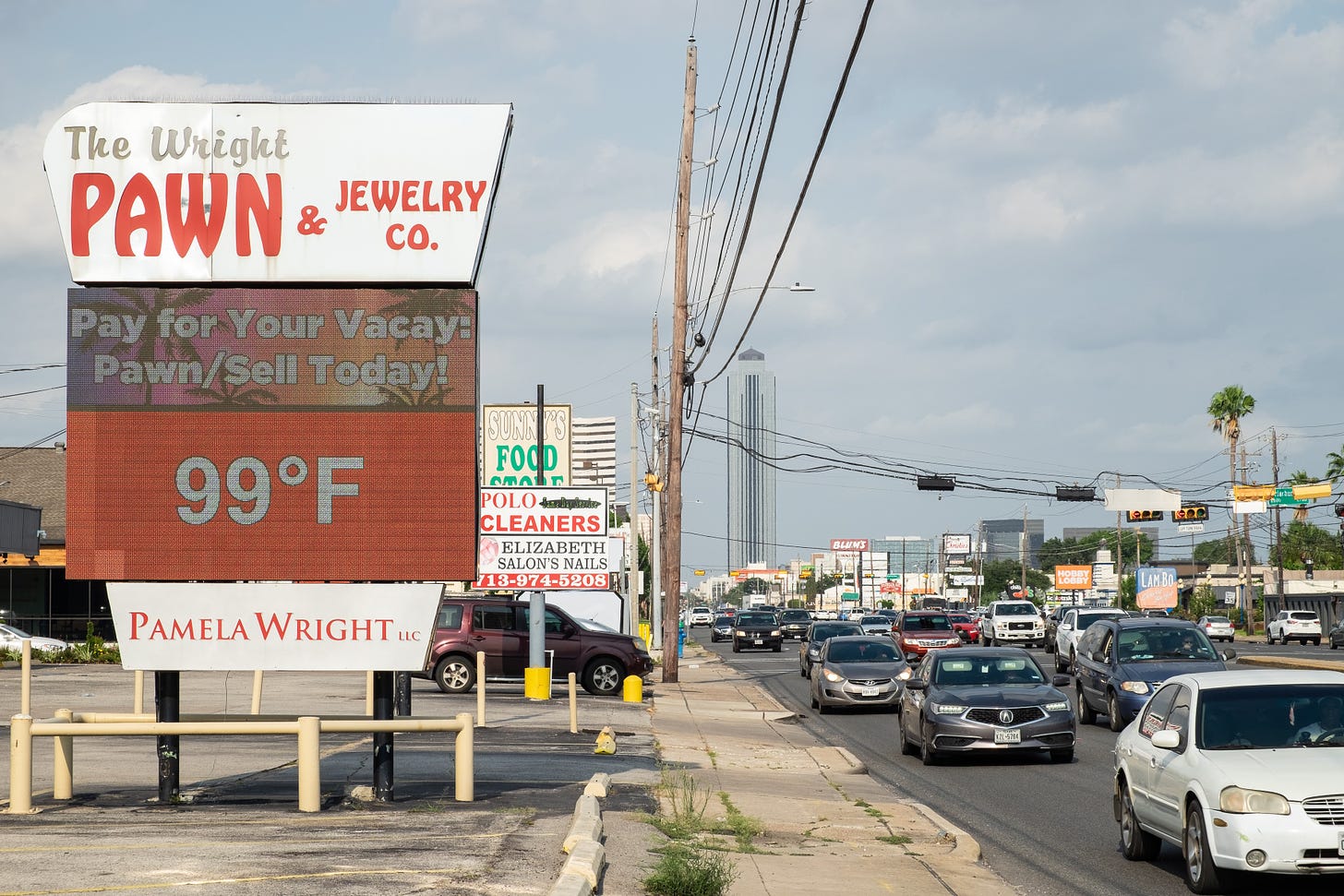It’s hot in Texas.
Unusually hot, even for here. Record or near-record heat in some places. In some cases, deathly hot.
And it’s not just Texas. Extremely high temperatures stretch across the southern United States, and high temperatures are forecast to spread north and east in the coming days.
There are also heat warnings in California for the upcoming holiday weekend — and that means a threat of wildfire.
It’s true that summer is always hot, especially in Texas. But it’s also true, according to extensive scientific research, that something has changed. Our planet is warming, and human activity is a driving factor. No amount of denial of that reality will keep us safe. Quite the contrary.
We have no choice but to face the truth and try to minimize the damage.
It is infuriating to see politicians in states like Texas and Florida, which are extremely susceptible to our climate crisis, refuse to reckon with what is so apparent. Things are getting worse, and these trendlines will continue. We don’t know how bad they will get, but that doesn’t mean we are powerless.
First, however, we must contend with the data. And one piece that is particularly concerning is what’s happening at night. In the past, even on hot summer days, evenings frequently brought some relief as temperatures dropped. Now, that is often not the case. And scientists say it’s because of climate change.
CNN reported on that phenomenon with regard to the current heat wave:
Overnight temperature records are expected to far outpace daytime records this week. Around 90 afternoon high-temperature records could be broken across the South, from Texas to the Mississippi Valley and parts of Florida, according to data from the National Weather Service.
But overnight temperatures will also stay abnormally high, with potentially 180 nighttime records broken over the next seven days...
“We think it’s because as the days grow warmer, there is more moisture in the air that traps the heat,” Lisa Patel, the executive director of the Medical Society Consortium on Climate and Health, told CNN. “During the day, that moisture reflects the heat, but at night, it traps the heat in.”
The consequence of hotter nights strikes disproportionately on the most marginalized, who might not have air conditioning or the funds to pay for the electricity to run it. Poor urban neighborhoods also tend to have fewer parks and trees, which means the asphalt bakes in the day and radiates heat overnight. Heat can kill, especially the ill and elderly. It can also disrupt sleep patterns and increase anxiety and stress.
High temperatures might not be as visually dramatic as other natural phenomena exacerbated by climate change, like hurricanes and wildfires, but they’re just as serious. And they expose our vulnerabilities — particularly antiquated power grids not up to the task of demand spikes when people crank the air conditioning. We will need to make these systems more resilient and drastically increase the extent to which they are powered by alternative energy. Using more fossil fuels to generate electricity to contend with the heat from climate change constitutes a foolish and dangerous feedback loop.
Thankfully, more alternative energy is taking hold, even — yes, especially — in Texas. And not a moment too soon. One major factor for why the state’s grid hasn't collapsed with this heat wave, according to reporting in The New York Times, is “an unlikely new reality in the nation’s premier oil and gas state: Texas is fast becoming a leader in solar power.” The article noted that “the amount of solar energy generated in Texas has doubled since the start of last year. And it is set to roughly double again by the end of next year.” Furthermore, Texas is a leading state for wind energy.
But more will be needed, and fast. And yet Texas’s Republican state government supermajority echoes the party’s national stance of climate change denial and outright hostility to most mitigation efforts. This is an all-hands-on-deck moment, and we have politicians willfully steering us into the shoals.
We have to adapt. Air conditioning is no longer just something that’s nice to have; it's a matter of life and death. Trees aren’t just visually appealing aspects of an urban landscape; the shade they provide is essential to public health. Where we build, how we build, and how we power ourselves all should be reexamined.
In a warming planet, resilience requires reckoning with reality and resolving to act.
This effort is supported by the Steady community. If you aren’t already a member, please consider subscribing.




Thank you for your post, Mr. Rather.
My elderly parents in Houston are prisoners because of the heat, but at least they can afford AC and don’t have to go out to work.
My heart goes out to our animal and insect friends who must be suffering so. Can you imagine this heat without access to water or AC and with a fur/feather coat on?
If you’re anywhere in the world where there is drought, please consider leaving a shallow bowl of water out for our fellow living beings. It could well save someone’s life, and it doesn’t cost anything. As an added bonus, it is positively joyful to watch birds frolic and splash when they find some unexpected relief.
Wisdom is there for those who will see it. Sadly that does not include a lot of people.